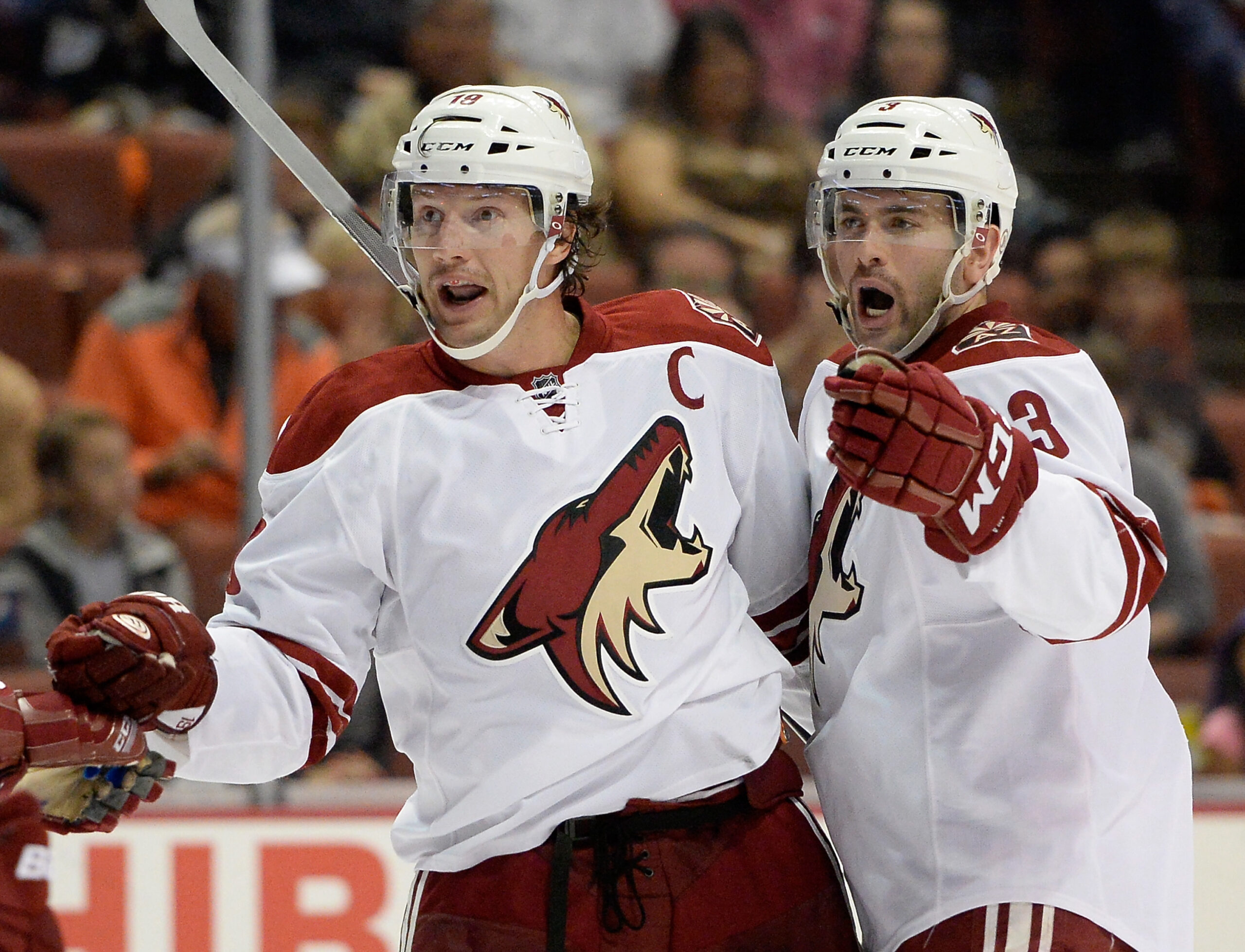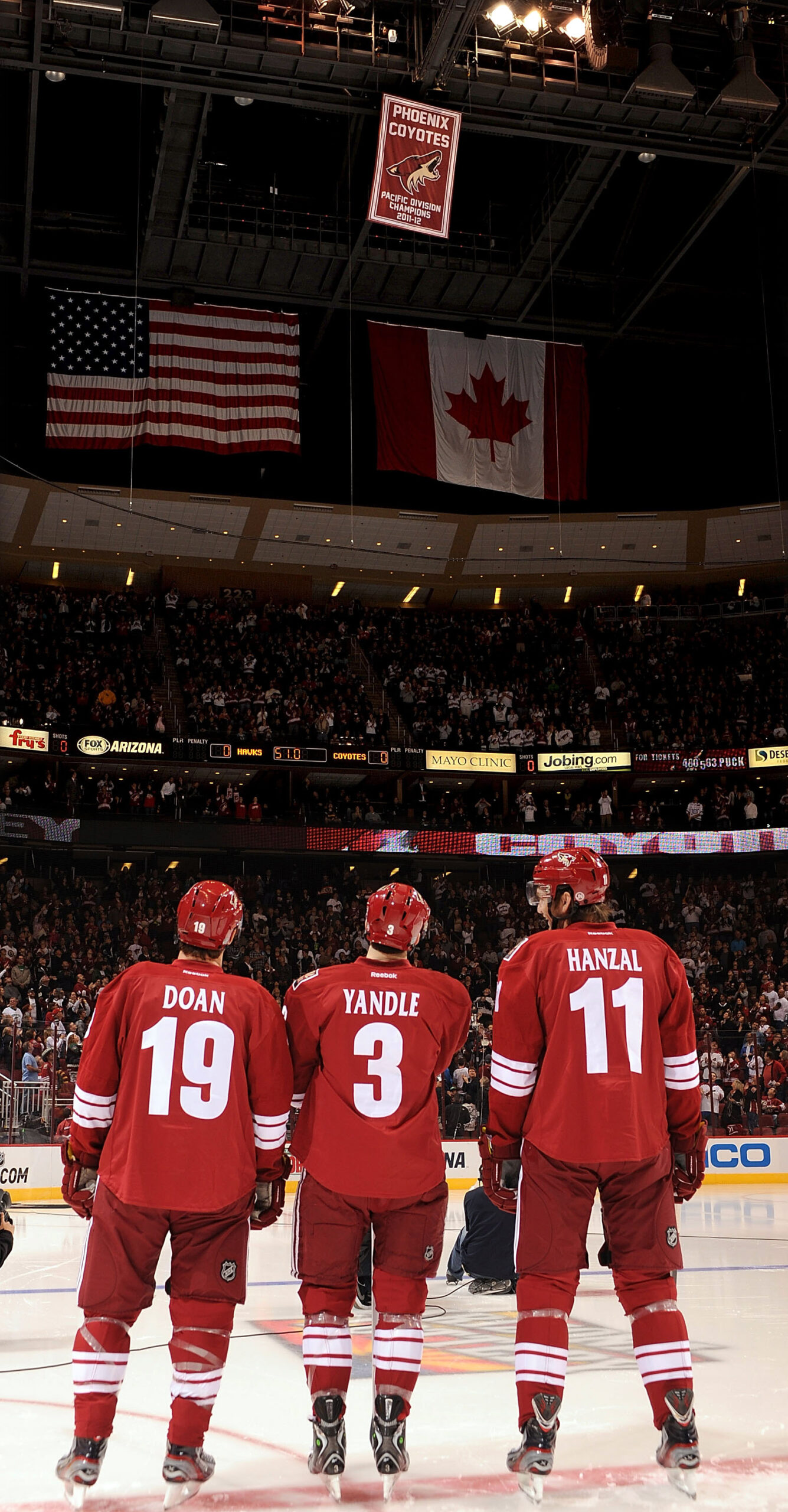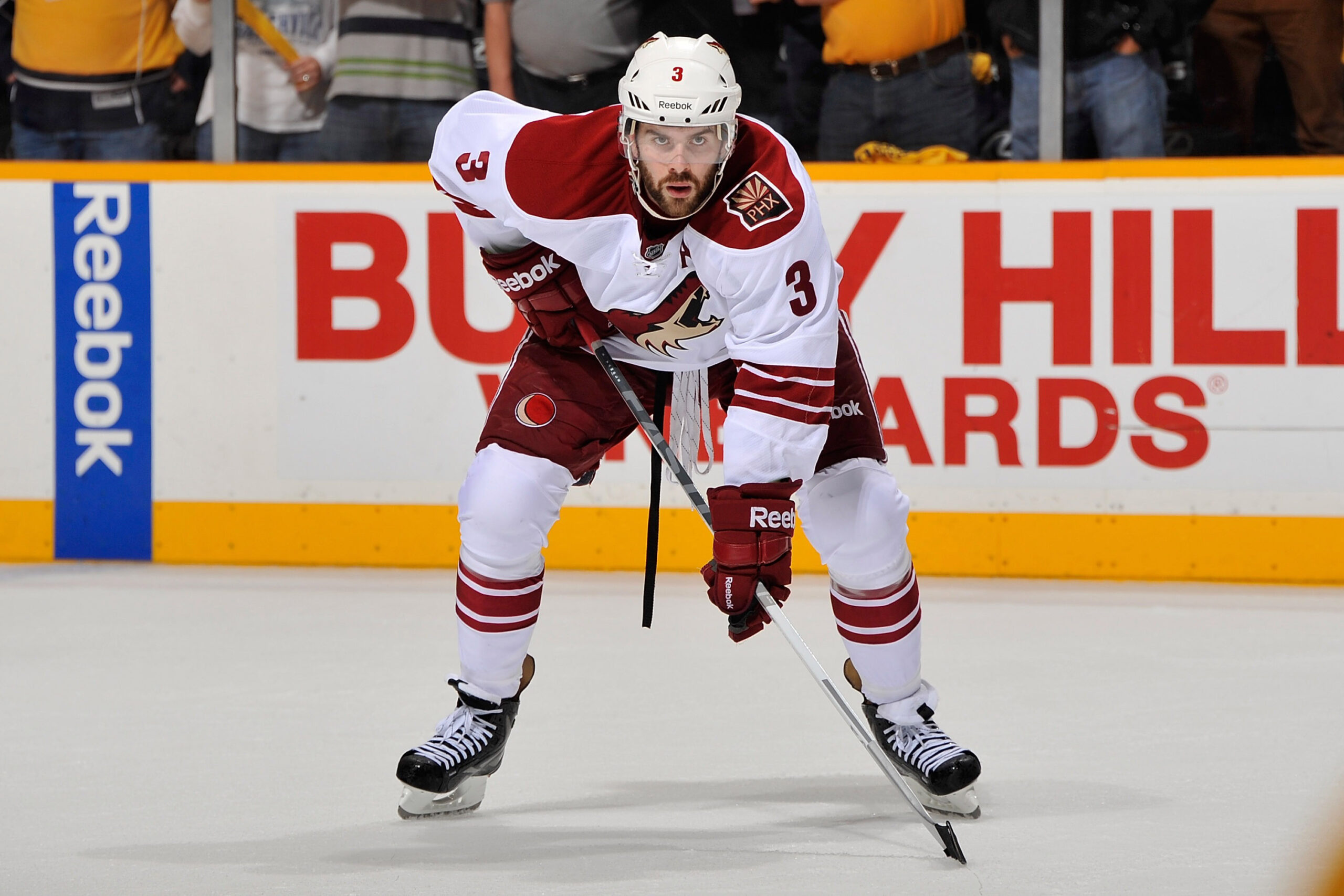© 2026 ALLCITY Network Inc.
All rights reserved.

Mike Barnett had an unusual vantage point for the 2005 NHL Draft as he watched Keith Yandle drop through the first three rounds.
The event was originally scheduled for June 25 at the Corel Centre in Ottawa, but the season-canceling lockout was still in effect so the draft had to be postponed. When the lockout ended on July 22, there was too little time to plan another draft at the arena so the NHL shifted the event to a ballroom at the Westin Hotel from July 30-31.
Due to space limitations, only a handful of Coyotes officials were seated at the team table while the amateur scouts were all sequestered in a hotel suite. As Round 3 proceeded, Barnett wondered why Yandle, a Cushing Academy defenseman, hadn’t been selected. With 15 goals and 54 points in 34 games, the Boston-area product had been named to the All-New England First Team.
When Barnett called up to the scouts’ suite, they told the Coyotes GM that there were some “yellow flags” around Yandle because he had been involved in an off-ice altercation; reportedly a bar fight. Many scouts were skeptical; Steve Lyons was not.
In a thick Boston accent, Lyons proclaimed: “That’s the very (expletive) reason we want this guy!”
Barnett chuckled. He had seen Yandle play. He saw no reason for Phoenix to pass on him again so with the team’s fourth-round selection (105th overall), the Coyotes chose a guy that later became a key cog in the best run in franchise history.
Seventeen years later, as Yandle announced his retirement on the Spittin’ Chiclets podcast, it is beyond debate that he is also the best later-rounds pick in Coyotes franchise history. Yandle retired with the sixth-most points of any player chosen in the 2005 draft (619), and he did so as a defenseman, finishing behind only Sidney Crosby, Anže Kopitar, Paul Stastny, Kris Letang and TJ Oshie, and seven places ahead of teammate Martin Hanzal, who went 17th overall that same year.
He also retired with the second-most points by a defenseman (311) in franchise history, and he still owns the NHL’s longest consecutive games played streak (989).
“I never in my wildest dreams thought I would play 1,000 games in this league,” said Yandle, who was scheduled to join the PHNX Coyotes live show on Friday. “I played with guys in Phoenix who were kind of finishing their careers there and having a lot of ceremonies like that, and I remember thinking, ‘This would be the coolest thing in the world, but what are the chances because how many guys play 1,000 games?’
“When I did get to 1,000, I was probably as shocked as anyone. Just knowing all the things that you didn’t know as a young kid coming up, and learning over the years how hard this game is, it was a pretty special moment.”

When Yandle reported for his first training camp, all of that south Boston brashness could not overcome the fear that he felt while skating among some NHL legends. Brett Hull was there for his first NHL training camp. So were Curtis Joseph and Doan, who had been named captain two seasons earlier.
Yandle was taking part in a captain’s practice at the Ice Den Scottsdale, focused solely on working hard and not screwing up drills when Doan skated over to him, removed his glove and shook his hand.
“I think it helped that Keith Tkachuk’s family and my family are good friends,” Yandle said. “Keith had called Doaner before my first training camp and he was like, ‘Hey, look out for this kid.’ When Big Walt tells you to do something you do it.”
Yandle felt like a kid at an autograph signing, but he had no idea that he was about to forge one of the closest friendships of his life.
“I don’t really know why we hit it off because if you look at it, he’s a cowboy from the middle of nowhere, Canada and I’m a street kid that grew up in a completely different lifestyle,” Yandle said. “Doaner told me he rode a horse to school and I had never heard of anything like that in my entire life.
“That was a cool part of being in the NHL was just meeting guys from totally different lifestyles. Doaner also loves giving guys a hard time, but he’s also good at taking a joke, so me and him were able to riff off of each other for a long time.”
Doan has a simple explanation for the unlikely friendship.
“He is just so likable so everyone likes him,” Doan said. “That’s just the way it is. He has that ability to connect with people.”
Talk to Yandle’s former teammates, whether they played with him in Arizona, New York, Florida or Philadelphia and they will universally laud him as a “great teammate.” Humor was a major part of that formula.
“I will remember him as probably the funniest guy I ever played with,” former Coyote Martin Hanzal said. “I had the best time with him outside of hockey and inside in the locker room. He was always sarcastic, he was always telling jokes, he was dancing after wins (this was his most famous dance) and his Boston accent was awesome.”

Yandle’s personality was apparently inherited. Doan said that his infamous nickname, Jelly, which is derived from his initials KY, was bestowed upon him by his uncles.
“At first, he wasn’t sure about us calling him that,” Doan said, laughing, “but after a little while he was like, ‘Oh, yeah.'”
While Doan was responsible for choosing the team’s song after wins, Leon Redbone’s “Come and Get Your Love,” Yandle was a hip hop guy who knew all the words to cuts from Lil’ Wayne and Drake.
Yandle’s humor even made its way onto the ice in games. He made the word “Sonk” famous when he’d yell it out after faking out a defender with a faux pass from behind the net. He and defensive partner Derek Morris also crafted a lesser known but equally humorous phrase. When they’d make a good pass or play, you could hear either scream out, “Juicy.”
Yandle wasn’t all prankster, however. When a terrorist attack struck his hometown Boston Marathon in 2013, he inscribed the message “Pray For Boston” on his skate before the Coyotes hosted the Sharks, and he honored 8-year-old victim Martin Richard by wearing his name on his jersey in warm-ups before a game in Chicago.
Yandle wasn’t ready for the NHL in his draft year so Barnett persuaded him to play for the QMJHL’s Moncton Wildcats, who owned his rights. Moncton was coached by 1997 Jack Adams Award winner Ted Nolan, and the Wildcats were set to host the Memorial Cup that season so Barnett thought Yandle would have a great development opportunity.
In one season in the Q, Yandle had 25 goals and 84 points in 66 games. He was named the league’s top defenseman and, alongside notable teammates such as Brad Marchand and Jason Demers, he led the Wildcats to the Memorial Cup final.
Even so, he was still an unfinished product when he arrived for camp the next two seasons, and even when Dave Tippett took over as coach for the 2009-10 season.
“There was still a little bit of wild horse in his game,” Tippett said, chuckling, “but right off the top, I’ll say that Keith Yandle is one of the most enjoyable players I’ve ever coached just because he’s so upbeat and he’s such a great player in the dressing room.
“His second season with us, he was playing kind of third-pair minutes with some power-play time and we had a bunch of injuries so we put him with Derek Morris and they were playing I think it was 25 to 30 minutes a game. He just played unbelievable and when he took that step he never came back to earth.”
There were plenty of contributors to the Coyotes’ run of three straight playoff appearances and a 2012 Western Conference Final appearance, but Yandle was front and center. In 2011-12, he led the team in average ice time (22:20) and he finished fourth on the team in points (43) behind Ray Whitney, Radim Vrbata and Shane Doan. In 2010-11, he finished fifth in Norris Trophy voting after finishing third in the league in points among defensemen with 59.
“There were two or three years there where he was as good of an offensive defenseman as there was in the entire league and I would have taken him over pretty much anybody,” Doan said. “His skating was unbelievable. He was faster than everybody on the ice because he got up and down the ice with less effort. He was able to pick up the puck and skate it out of his own zone for so many years that people just took it for granted.
“Everyone was like, ‘What else does he do though?’ I’m like, ‘What else does he do! No one else can do that!’ It’s a big deal. He just picked it up and skated it out of the zone because he was faster and saw the ice well enough and just could get out of the zone and skate it all the way to the red [line] and it was easy. That means you don’t have to defend when you have a guy like that.”
Tippett thinks Yandle’s prime came even later than the 2012 Western Conference Final run. In the lockout shortened season of 2012-13, he led the team in points and he did it again the following season. Unfortunately, with the Coyotes entering a rebuild phase, Yandle’s offensive prowess made him the team’s most tradable chip. On March 1, 2015, the Rangers acquired Yandle, defenseman Chris Summers, and a fourth-round pick for defenseman John Moore, forward Anthony Duclair, a 2016 second-round pick, and a conditional 2016 first-round pick.
“That was a tough day; I wasn’t too happy,” Doan said. “Him and Martin Hanzal, I thought I’d finish with those guys. I had watched them come in as young guys, watched Yands become such a vital part of the room. I was happy for him because obviously he was excited for the opportunity in New York, but I thought he would stick around the whole time so that was a hard one.”
Yandle remembers the emotions of that day.
“[Shane] came over to my house, and I think he gave me a ride to the airport,” he said. “I remember him getting a little teary eyed and I was obviously crying. You never know what you’re getting into. When you’ve been on the same team and around the same guys for so long, it was kinda like, ‘Oh boy, what’s gonna happen now?’ But I was able to fit in good there and obviously a lot of that had to do with the way that the older guys helped me out in Phoenix to get ready for a situation like that if it ever came.”

Retirement wasn’t as difficult a decision for Yandle as it is for other players. He could see the writing on the wall in his last season in Philadelphia. While the Flyers allowed him to break the consecutive games played record, they scratched him before he could get to 1,000 straight games.
“Last year during the season was one of the first times in my career when the thoughts even came up in my mind,” he said. “I remember playing with guys before who said that once that’s in the back of your mind you can’t really get it out. I’d say from my Christmas on, I kind of had a little bit of a feeling that this was going to be it for me. Coming down to the last few games of the season was a little tough, knowing that that was going to be it, but I just tried soaking it in as much as I could.
“I’m not really a guy that gets too ahead of the curve or thinking in the past anyway. I was just kind of enjoying every day. There were definitely times where you’re like ‘Oh, man, I’m really gonna miss this or that;’ just little things like being in the locker room, hanging out, but at the end of the day it obviously has to come to an end at some point and I think for me it was it was a fun way to go out with with those guys last year.”
He hasn’t decided what he will do with all of his free-time, other than soak up the sun and ocean breeze in South Florida, his new home.
“I might try to get into the media or try to get on with a team, but for now I’m just trying to take it easy, enjoy some time with the family and not really get too ahead of the decision,” said Yandle, who attended parent-teacher conferences on Friday. “I’m still trying to figure it out. I’ve never been in this situation before, you know?”
The Coyotes were just one chapter in Yandle’s 16-year pro career, but Arizona comprised nine of those years, shepherding Yandle from NHL boyhood to NHL manhood. Whether it was Jeremy Roenick indoctrinating him into team culture by making him think he would have to pay for the entire team’s meal as a rookie, or the more salient lessons he absorbed from veterans, Yandle can’t think anything but positive thoughts about his time in the Valley.
“I learned so much from the guys that I was surrounded with there,” he said. “When you’re in the thick of things, especially as a younger player, you’re just trying to absorb as much as you can, trying to learn, trying to get better, trying to work on your game. But I think the biggest thing I’ll take from that time is the guys that we had there who were so willing to help out a young guy and help a guy grow on and off the ice.”
Yandle thought it would ever end.
“My whole there, just from watching Doaner, I wanted to be a Coyote for my whole career. I just wanted to stay there and do exactly what Doaner did,” he said. “He was a guy that I just tried to be like, on and off the ice. When that didn’t work out, I was very grateful for my time in New York and Florida and Philly, too, but looking back at it, it just goes so fast. I was there eight and a half years so you’re like, ‘Oh my god, that was a big part of my life.’
“I was away, really for the first time in my life, on the other side of the country, just kind of learning how to be an adult. I started my family out there. When you think about everything, I really loved my time there; the people, life away from the rink, the friends that we made and how nice and clean a city it is. That’s the stuff that I miss a lot about Arizona. You almost wish you could have a button where you could just press it and go back and look at all those old memories.”
Top photo of Keith Yandle via Getty Images
Follow Craig Morgan on Twitter
Comments
Share your thoughts
Join the conversation



